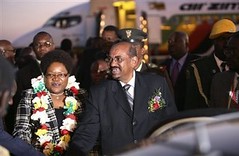
Sudanese President Omer Hassan Al Bashir, right and Zimbabwean Deputy President Joyce Mujuru, left , upon his arrival in the resort town of Victoria Falls in Zimbabwe, Saturday, June 6, 2009. (AP)
Originally uploaded by Pan-African News Wire File Photos
From Golden Sibanda in Victoria Falls
Courtesy of the Zimbabwe Herald
Vice President Joice Mujuru has said political stability has set Zimbabwe on the path to recovery, but warned a lot remains to be done for the economy to flourish.
VP Mujuru made the remark in a speech read on her behalf by Minister of State in her office, Sylvester Nguni, at the Employers Confederation of Zimbabwe-Institute of Admini-stration and Commerce joint annual congress here on Thursday.
She said, "The introduction of the multi-currency system in January 2009 positioned the economy on the recovery path. The consummation of the inclusive Government in mid-February 2009 added the required political stability and positioned our country on the stability and growth mode.
"Be that as it may, a lot still remains to be done for us to have a fully recovered and flourishing economy."
She said Zimbabwe had the requisite human and natural resources to thrive but negative perceptions and illegal Western sanctions were hampering growth and development.
"The unsavoury perception and, coupled with sanctions, makes it difficult for us, as a nation, to mobilise external sources of finance necessary to resuscitate our economy," she said.
VP Mujuru hailed Emcoz and IAC for coming together to hold a joint congress under the theme "Inclusive Business for Economic Revival" and pointed out that every Zimbabwean, within or outside the border, had a role to play in economic revival.
VP Mujuru also lauded business for committing itself to the United Nations’ Global Compact to be implemented through the ambit of the International Labour Organisation’s Work Agenda for the formally employed.
The compact seeks to promote companies’ respect and concern for people and the environment.
VP Mujuru implored employers to go beyond corporate social responsibility by incorporating the marginalised and disadvantaged through employee share ownership schemes and other facilities.
Labour and Social Welfare Minister Paurina Mpariwa added that the Global Compact showed companies’ commitment to self-regulation by observing international human rights best practices.
She said her ministry was undertaking productivity mainstreaming in its policy, programmes and labour laws and that parties in the Tripartite Negotiating Forum were working together to make the national productivity institute operational. Minister Mpariwa also commended business for committing to the Kadoma Declaration, launched by President Mugabe earlier this year.
No comments:
Post a Comment